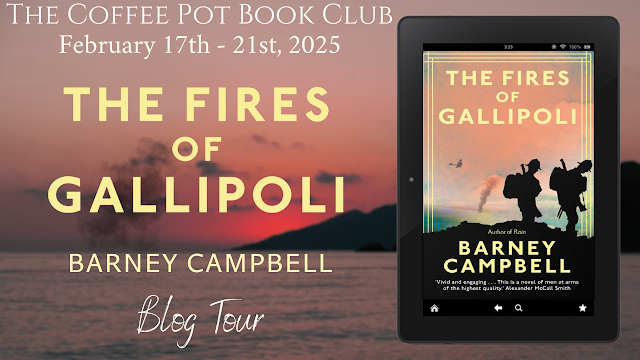The Fires of Gallipoli by Barney Campbell
Autumn turned into winter. The battalion moved a mile to the north-west of the blind crests to relieve a unit that was deemed combat ineffective following the twin heads of a failed attack and a virulent strain of dysentery that had torn through it.
Progress up to the line was appallingly slow, rivulets of loose earth and rocks running down the trench walls to line the bottoms with obstacles. To Edward, sleep-deprived and hallucinating in the cold, it was as though he was a giant treading through a twilit valley, the countless little landslips becoming mighty waterfalls tumbling down the sides into the plain below. His feet – as they stumbled on the pebbles and stones – were great hammers that crushed houses and villages. He realised he was grinning and that the sounds that punctuated his progress were his own short bursts of laughter. He took several gulps of air to snap out of it and hoped that no one had noticed him in that state.
The next day, the men got used to the tiny strip of ground that was now their home, titivating the line and getting to grips with the lie of their land.
And then came the evening. The normal weather of the daytime, no different from the hundred that had preceded it save for winter’s siphoning away its daily ration of heat, passed into a squally, adolescent late afternoon with fast-moving clouds scudding across the sky before a vast grey blanket was pulled across it.
At seven o’clock the first drops spattered down onto them, tiny pinpricks to start but growing soon to fat droplets that sounded like sleet as they hit helmets and hands clenched round rifles. They kicked up sand round the rims of the tiny craters they bored in the ground, soldiers craning their necks back to let them fall onto parched tongues. Within ten minutes, the rain had whipped up to a tempo that would not drop for three days, skin, uniform and ground all now equally saturated and the men sitting there like cattle, morale and discipline melting away.
After half an hour, Edward had never seen the men so low, so visibly deflated, so defeated. The wind picked up and up, each gust bringing waves of freezing rain onto their scant, thin uniforms. They started to shiver uncontrollably, some lucky ones seeking shelter under the flimsiest tarpaulins. Those who couldn’t sat in the bottom of trenches that had quickly become swamps, hands thrust into pockets, their necks bent forward over their chests as rifles were cast into the mud, sentry duties abandoned, anything military forgotten about. Each minute rammed home that the biggest threat to their survival now came not from the Turks but from the weather.
The darkness was total, with the moon entirely obscured. The mud grew into an ooze that sucked in anything that fell on it, a slick, slippy filth that afforded no purchase for their boots, the leather already sodden and chafing. Edward held off from looking at his watch for as long as he could, but eventually broke and saw its luminous hands tell him it was only nine o’clock; it felt like four in the morning. He was so cold that he knew that to sit and sleep might be fatal; he had to keep moving, so he began a lonely plod up and down the trench, slipping and sliding, cutting himself a dozen times, anything to keep moving, anything to encourage the men.

~ Alexander McCall Smith



Thank you so much for hosting Barney Campbell today, with his evocative WWI novel, The Fires of Gallipoli.
Take care,
Cathie xx
The Coffee Pot Book Club